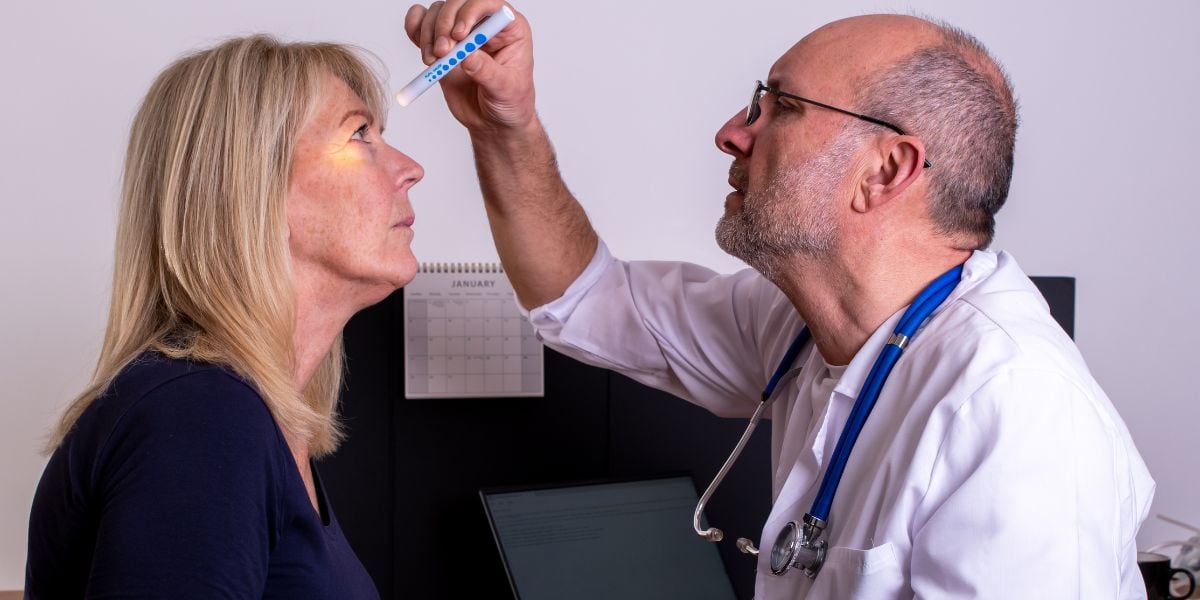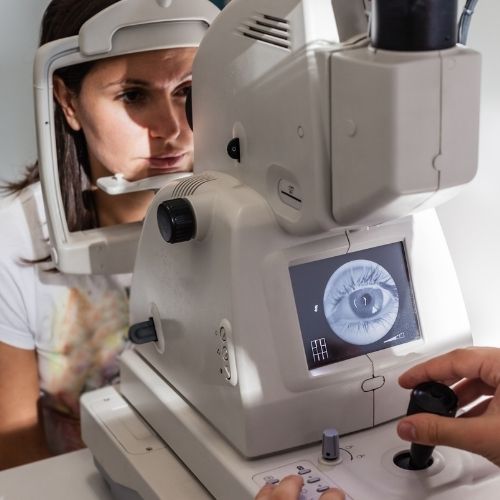Generally speaking, an autoimmune disease is a condition in which your body’s immune system gets confused. It thinks healthy tissues are foreign and thus a threat to the body’s health. As a result, the immune system does its job by attacking the threat.
One of the side effects of autoimmune disease is inflammation. This is not acute inflammation. In other words, the puffiness or swelling around a cut or a bruise. This is chronic inflammation. It is your body’s continued reaction even after the disease or threat is gone.

If you’ve been diagnosed with an autoimmune disorder — or are experiencing systemic symptoms like stomach upset, joint pain, hoarseness, or constipation — you might be dealing with an underlying inflammatory process that not only affects your body but can also impact your eyes. The eyes, with their delicate and highly vascular structures, are common sites of autoimmune activity. Left untreated, this can lead to serious complications and permanent damage.
If you have any suspicion that something might be affecting your eyes, have experienced recent vision loss, or haven’t had an eye exam in a while, we recommend scheduling an appointment with your eye doctor (optometrist or ophthalmologist) as soon as possible.
Common Autoimmune Conditions That Affect the Eyes
Here are some of the autoimmune and inflammatory conditions that can impact your ocular health:
Scleritis
Severe, deep eye pain caused by inflammation of the sclera (the white part of the eye). Frequently associated with rheumatoid arthritis and other systemic autoimmune illnesses.
Dry eye disease (Keratoconjunctivitis sicca)
Dry eye is common in Sjögren’s syndrome, lupus, and rheumatoid arthritis. It occurs when tear production decreases or the quality of tears changes, resulting in discomfort, blurred vision, and potential corneal damage if left untreated.
Uveitis
Inflammation of the uvea (the middle layer of the eye) is often associated with ankylosing spondylitis, psoriatic arthritis, inflammatory bowel disease, and other autoimmune conditions. Eye symptoms include eye pain, light sensitivity, and blurred vision.
Retinal vasculitis
Inflammation of the blood vessels in the retina is linked to conditions like Behçet’s disease, lupus, and other vasculitides. This can lead to floaters, blurriness, and possible loss of vision.
Thyroid eye disease (Graves’ orbitopathy)
Associated with Graves’ disease, this autoimmune condition affects the muscles and soft tissues surrounding the eyes. Symptoms can range from dryness and bulging eyes to double vision and optic neuropathy.
Other associated conditions
Additional autoimmune or systemic illnesses that can affect the eyes include:
- Multiple sclerosis (optic neuritis)
- Inflammatory bowel disease (episcleritis, uveitis)
- Granulomatosis with polyangiitis (sclero-uveitis)
Why an eye exam is important if you have systemic symptoms
Detecting an underlying inflammatory process early is crucial, as many eye problems can be treated or avoided when caught in time.
People who have been diagnosed with an autoimmune disease or experience systemic symptoms such as the following should schedule an eye health evaluation as soon as possible:
- Chronic stomach discomfort or constipation
- Persistent joint pain or arthritis
- Hoarseness or throat discomfort
- Fatigue and malaise
- Vision problems
Remember: an underlying inflammatory process can impact your eyes.
What are the treatment options?
Treatment will, of course, depend on your specific situation. One of the main decisions will be whether the treatment will be systemic (treats the body as a whole), local (treats just the eyes), or both.
Here is some general treatment information:
The first step in local treatment is usually the use of steroid medications (corticosteroids) to reduce eye inflammation. These steroids can be in the form of injections, eye drops, or pills. If the steroids are not effective, the next step is other immunosuppressive medications.
There are also targeted biologic treatments for autoimmune disease. Your eye care specialist can advise you on whether these options are suitable for you.
Schedule your consultation today with the internationally recognized doctors at AGEI
Or call
866-945-2745
Schedule an eye health evaluation today
Your eyes can reveal insights into overall health. At Assil Gaur Eye Institute, we utilize advanced diagnostic tools and clinical expertise to assess ocular signs and provide references that support the systemic management of autoimmune diseases as well.
The Assil Gaur Eye Institute (AGEI) is renowned for its expertise in refractive lens exchange and premium cataract surgery.
Take the first step toward crystal-clear vision—call (866) 945-2745 to schedule your consultation or request an appointment online.
Sources
Rosenbaum JT et al. “Ocular Involvement in Rheumatic Diseases.” N Engl J Med. 1998;338:22–30.
Fox RI et al. “Sjögren’s syndrome: clinical features, pathogenesis, and therapy.” J Rheumatol. 2005;32(7):1275–1284.
Jabs DA et al. “Standardization of Uveitis Nomenclature (SUN) Project.” Am J Ophthalmol. 2005;140(3):509–516.
Bartalena L et al. “Graves’ orbitopathy: a multidisciplinary approach.” Best Pract Res Clin Endocrinol Metab. 2020;34(1):101377.
Familial neuromyelitis optica
https://www.ncbi.nlm.nih.gov/pmc/articles/PMC2918892/
Autoimmune uveitis – Autoimmunity
https://www.ncbi.nlm.nih.gov/books/NBK459445/#:~:text=Autoimmune%20uveitis%20is%20a%20prevalent,and%20patient%20symptoms%20are%20essential.
Epidemiology of uveitis in a US population-based study
https://www.ncbi.nlm.nih.gov/pmc/articles/PMC5904090/














